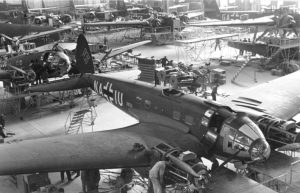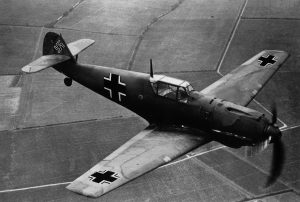
Aircraft bomber factory
Visits to the German Aviation Industry
During his visits to the Third Reich, Charles Lindbergh was often accompanied by his wife, Anne S. Morrow. During their stays, they lived as house guests of the American military attaché. His appearance in Germany was often greeted by major figures in German government and military. Lindbergh made five important visits to the Third Reich. His first trip started in July of 1936 and his last was in January of 1939. He met with many of the German aeronautical facilities, interviewed with influential members of the German aviation community, and examined the strength of the German Luftwaffe.
In Truman Smith’s case, he and the other military attaches were able to rise in prestige to see what was missing from their reports. One of the greatest gains during Lindbergh’s visits was the German government’s willingness to let him test fly their planes. Most important was the Messerschmidt BF-109 fighter plane, which would go on to be considered one of the greatest fighters of the Second World War. However, many in the United States, especially those who despised the Nazis, criticized Lindbergh for receiving the German Medal of Honor for his presents in Germany. However, his actions helped the American intelligence services in Berlin. The information that he and many others gathered in Germany startled them greatly about its military build-up.

Junkers tactical bomber in flight over Germany
The Effects of his Visits
From what Lindbergh, Smith, and many other informants had been gathered, the German Air Force was growing at an alarming rate and seemed to be gearing towards a war within Europe. Even though at the beginning the Luftwaffe was small, but it would soon in a few years would have greater number of aircraft of any European nation with experienced pilots ready to support ground forces. This became a great concern within not just the American military attaché in Berlin, but in Washington D.C. However, this may have caused a divide about how to respond to this German re-militarization. Lindbergh chose the American First route of not getting involved in an European war and others wanted to get into conflict when it came. Still, the information that was found did effect the relationship between the United States of America and Nazi Germany. Instead of taking things for granted, there was an acknowledgement of an ever growing storm.
Click here to continue